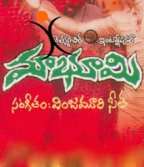Maa Bhoomi
| Maa Bhoomi | |
|---|---|
 | |
| Directed by | Goutam Ghose |
| Produced by |
B. Narsing Rao G. Ravindranath |
| Written by |
B. Narsing Rao (screenplay) Krishan Chander (story) Partha Banerjee (dialogue) |
| Starring |
Sai Chand Rami Reddy |
| Music by | Vinjamuri Seetha Devi |
| Cinematography | Kamal Naik |
| Edited by | Rajagopal |
Production company | |
Release dates |
|
Running time | 158 minutes |
| Country | India |
| Language | Telugu |
Maa Bhoomi (Telugu: మా భూమి, English: Our land) is a 1980 Telugu drama film written and produced by B. Narsing Rao based on a play by Krishan Chander on the Telangana Rebellion in Hyderabad State. The film depicts a typical life of villagers under feudalistic society in Telangana region. It was the first feature film of director Goutam Ghose. The film was premiered at the International Film Festival of India, 1980,[1] India's official entry at the Karlovy Vary Film Festival of July 1980,[2] the Cairo and Sidney Film Festivals.[3][4] The film is listed among CNN-IBN's list of hundred greatest Indian films of all time.[5]
The plot
The film follows the story of a young landless Telangana peasant named Ramaiah (Sai Chand) from Siripuram, Nalgonda, a region under foreign rule. The British have appointed the Nizam as the regions governor. The nizam in turn have appointed the Reddys and the Patils as the Zamindars(Known locally as Doras) of the region who collect taxes among various other things for the Nizam. Further, the Nizam have granted them with Titles, Jagirs and Judicial rights enabling them to seize thousands of acres of land from the peasants and turning them into tenants.
Ramaiah Rebels against the corrupt Nizam leadership in Hyderabad. When his wife has to submit to sexual coercion by the officials, he befriends the Communists and participates in the independence struggle. The peasants form various paramilitary groups and launch guerilla warfare attacks across the region with country made weapons. They raid and take over regional Dora bases across rural telangana at night and burn all the land documents found in the bases in the open yard symbolising their triumph. Eventually they take over the village after the Indian Independence.
The Doras manage to escape to Hyderabad reporting the events to the Nizam leadership. The Nizam commands the Razakars, a private Islamist militia, which perpetuates a massacre over the Telangana peasants. After months of burning, looting, rapes and killings, the Indian army marches into Hyderabad and suppresses the Razakars and the Nizam with Operation Polo in September 1948 and annexes the Telangana region back into the Indian Union. In independent India, the Zamindars(Doras) are returned to power by joining the Congress government. The Doras have abandoned the Nizam and pledged allegiance to the Congress Party. The Telangana people now find themselves facing the same struggle all over again.
Soundtrack
- Bandenaka Bandi Katti Padahaaru Bandlu Katti written by "Bandi yadagiri"
- Palletoori Pillagaada Pasalagaase Monagaada (with titles) written by Suddala Hanumanthu
- Podala Podala Gatla Naduma, Podicinadhira Chandamama
State Awards
- Nandi Award for Best Feature Film
- Nandi Award for Best Screenplay Writer
- Filmfare Best Film Award (Telugu)